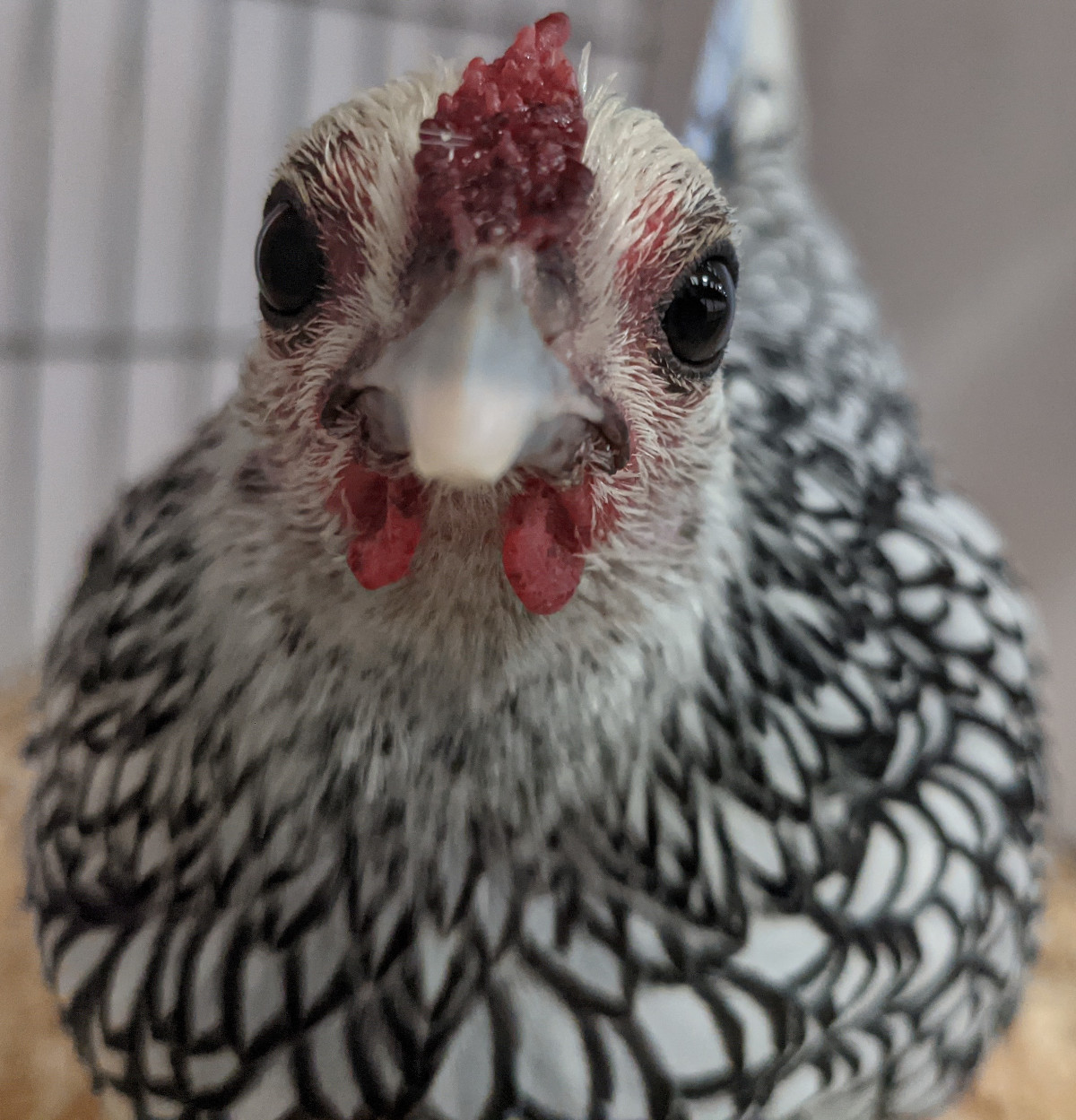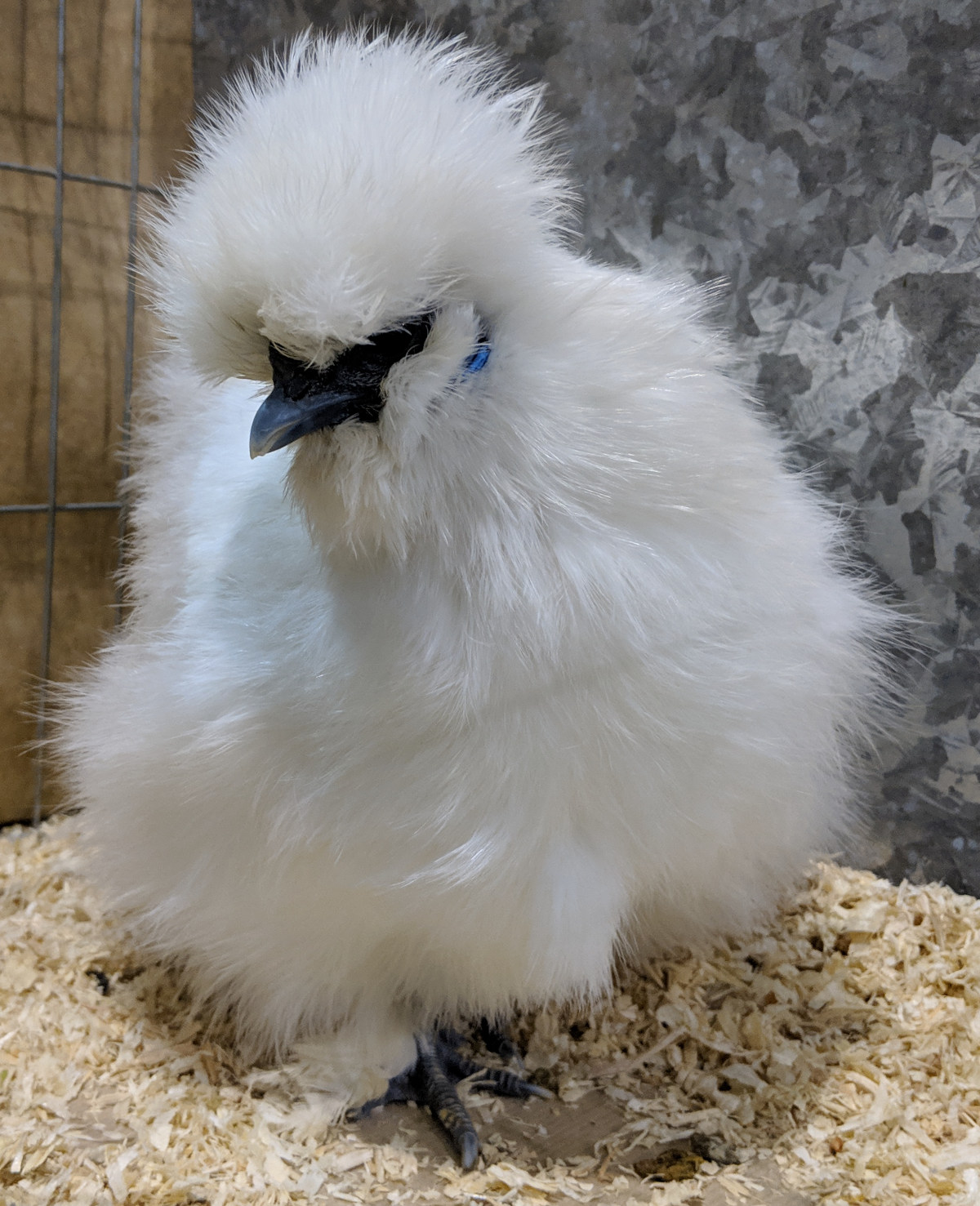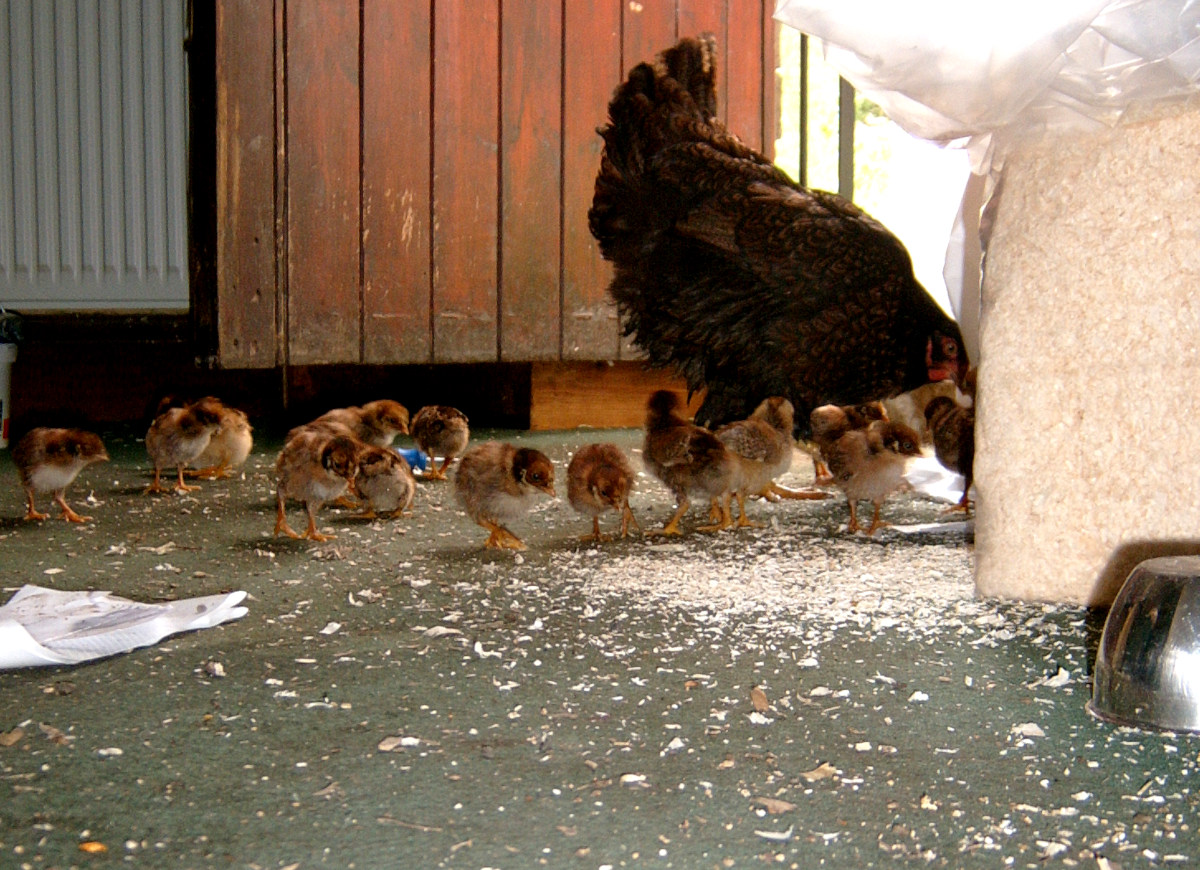Chickens as pets: Which breeds to choose and how to look after these easy to keep egg-laying companions.

So I have been running a survey of chicken keepers for the past 12 months and one of the surprising results so far is only around 20% or one in 5 consider their chickens as pets. I have well over 300 birds and yet I still consider them all as pets.
My Sebright hen in the header image loves to pretend she is Long John Silvers parrot by sitting on my shoulder whenever she can.
Table of Contents
I have found my chickens are not only fascinating creatures, but they also provide fresh eggs, natural fertiliser, and entertainment. Plus, they can be a great way to teach kids about responsibility, sustainability, and animal welfare.
Below: Some of my chickens showing how much they like being around me.
However, raising chickens requires some knowledge, effort, and dedication. It's not as simple as just putting them in your backyard and letting them roam free. Chickens have specific needs and behaviours that must be understood and met to keep them healthy and happy.
Can you keep chickens as pets?
You can keep chickens as pets. In fact, many people do and I class all my chickens as pets. Some chickens can be very friendly and affectionate, and they can provide you with years of enjoyment. It is important to do your research before getting chickens, as they do require some special care and attention.
Chickens can be very rewarding pets. They are social creatures that enjoy being around people. They can also be very curious and playful. If you are looking for a pet that is low-maintenance but still provides companionship, a chicken may be the right choice for you.
Here are some things to consider if you are thinking about getting chickens as pets:
- Do you have enough space? Chickens need a coop to sleep in and a run to exercise in. The coop should be at least 4 square feet per chicken, and the run should be at least 10 square feet per chicken.
- Can you keep at least three? Chickens are social creatures that need the company of other chickens.
- Can you afford them? Chickens will need feed, water, shelter and veterinary care during their life.
- Do you have time to care for them? Chickens need to be fed and watered daily, and their coop needs to be cleaned regularly. You will also need to collect their eggs.
- Are you allowed to keep chickens in your area? Some cities and towns have ordinances that prohibit or restrict the keeping of chickens. Check with your local government to find out if there are any restrictions in your area.
Once your chickens are settled in, you will need to feed them and water them daily. You can feed them a suitable nutritionally balanced chicken feed, or you can make your own feed.
Below: You can play with chickens, mine love to chase.
You will also need to collect their eggs daily. Chickens typically lay eggs most days, but their production will decrease in the winter months.
Some popular breeds for pet flocks include:
First, you will need to purchase chickens. You can buy them from a breeder, a hatchery, or even a feed store.
When choosing a breed, it is important to consider your needs and preferences.
Below: My Silkies are delightful, friendly and easy to tame but they are terrible layers.

Do you want a breed that is good for laying eggs, meat, or both? Do you want a breed that is friendly with children or other pets? Once you have considered your needs, you can start researching different breeds to find the perfect one for you.
These are just a few of the many popular and friendly breeds of chickens.
| Breed | Temperament | Egg Laying | Other Facts |
|---|---|---|---|
| Buff Orpington | Friendly, docile | 250-300 eggs per year | Good for beginners, cold-hardy, good layers |
| Cochin | Friendly, docile | 150-200 eggs per year | Good for children, cold-hardy, good foragers |
| Japanese bantams | Small, very friendly | 80 to 100 tiny eggs per year | Really good for smaller spaces. |
| Easter Egger | Friendly, curious | 150-200 eggs per year | Lay a variety of coloured eggs, good layers |
| Faverolles | Friendly, gentle | 150-200 eggs per year | Silky feathers, good foragers |
| Polish hens | Small, easy to care for, gentle | 100 to 140 small eggs per year | These have great big Tina Turner style crests on their heads. |
| Jersey Giant | Gentle, docile | 150-200 eggs per year | Large breed, good for meat |
| Sussex | Active, alert | 250 -280 eggs per year | Good layer, just as friendly as other breeds |
| Plymouth Rock | Friendly, docile | 200-250 eggs per year | Good for beginners, cold-hardy, good layers |
| Rhode Island Red | Friendly, active | 200-250 eggs per year | Good for meat and eggs, cold-hardy |
| Silkie | Friendly, docile | 100-150 eggs per year | Silky feathers, good foragers |
Chicken breeds to avoid when choosing pets:
- Game birds,
- Shamo and Malay types, these were originally bred to be fighting chickens and are not suitable as pets.
- Leghorns, well known for being flighty and bad tempered,
- Mediterranean types like the Ancona. They fly well and range quite far.
Consider your climate, space, and goals when choosing your breeds. Some breeds are better suited for colder or warmer climates, while others require more or less space to roam. Some breeds are more docile and child-friendly, while others are more active and independent.
Below: Plain brown hybrid chickens showing they to can be good pets, here they are eating treats out of my hand.
Once you have your chickens, you will need to build or purchase a coop for them. The coop should be sturdy and well-ventilated, and it should have a roosting area, a nesting box, and a food and water source. You will also need to provide your chickens with a run where they can exercise. The run should be fenced in to keep predators out.
Can you raise a chicken as a house pet?
It is possible to raise a chicken as a house pet, but it is not recommended and can seriously impact the health of the humans that live in the same house.
Reasons not to keep chickens indoors:
- Dander or feather dust can cause allergic reactions and scarring in the lungs. This used to be called poultry fanciers lung.
- The mess. Chickens can not control their bowels or ask to be let out like a dog might.
- The smell. Chickens and their poop has a unique smell.
- Chickens are unable to scratch indoors and natural behaviours are key to keeping them healthy.
- Chickens are sociable flock animals that need their own company.
- They will still need somewhere to perch, dust bathe and lay their eggs.
Chickens are social animals that need to be able to run and forage, and they produce a lot of waste that can be difficult to manage indoors.
Below: I think the mess in this picture shows why chickens indoors is not a good idea.

If you are considering raising a chicken as a pet, it is important to do your research and make sure that you can provide them with the proper care.
You will likely not be able to keep a pet chicken in an apartment.
Some of the things you will need to consider if you want to raise a chicken as a pet include:
Housing: Chickens need a coop to live in that is large enough for them to move around comfortably and lay eggs. The coop should also be predator-proof.
Food: Chickens need a diet of fresh food and water. They will also need grit to help them digest their food.
Exercise: Chickens need to be able to run and forage. If you are keeping them indoors, you will need to provide them with a large space to exercise.
Waste: Chickens produce a lot of waste, which can be difficult to manage indoors. You will need to clean their coop regularly to prevent the build-up of ammonia and other harmful substances.
Predators: Chickens are prey animals, so they are at risk of being attacked by predators. If you are keeping them outdoors, you will need to take steps to protect them from predators, such as building a fence around their coop.
If you are not prepared to provide your chicken with the proper care, it is best to consider another type of pet.
Can you house train chickens?
It is possible to house train a chicken to some extent, but it is not easy and it will never be completely house trained or be able to ask to go outside to the toilet.
Chickens also have no control over when they poop, it is controlled by an autonomic nervous process that can not be controlled by the chickens itself. This makes it difficult to train them to use a litter box.
There are a few things you can do to try to house train a chicken:
- Start with a young chickens or even day old chicks. Chickens are easier to train when they are young.
- Provide a litter box. Place the litter box in a quiet, private area. Fill it with sand or wood shavings.
- Take your chicken to the litter box regularly. When you see your chicken starting to look for a place to go to the bathroom, take her to the litter box.
- Praise your chicken when she uses the litter box. Give her a treat or a pat on the head.
- Be patient. It will take some time for your chicken to learn to use the litter box and most never do.
If you are not successful in house training your chicken, you may need to keep her in a coop or run.
How do you train your chickens to be good pets?
Careful interaction and treats from day one is key to successful chicken training.
Here are some tips on how to make a chicken a good pet:
- Choose the right breed. Not all breeds of chickens are suitable as pets. Some breeds are more docile and friendly than others. Do your research and choose a breed that is known for being good with people.
- Food is the direct route to any chickens heart. Treats will be a big advantage when training.
- Provide plenty of space. Chickens need plenty of space to run and forage. If you are keeping them indoors, you will need to provide them with a large coop. If you are keeping them outdoors, you will need to provide them with a large run.
- Socialise your chicken. Chickens are social animals and need to be around other chickens. If you are only keeping one chicken, you will need to socialise it with people regularly.
- Handle your chicken gently. Chickens can be easily frightened, so it is important to handle them gently. Start by petting them on the head and neck. Once they are comfortable with this, you can start to pick them up.
- Be patient. It takes time for chickens to get used to new people. Be patient and give them time to adjust to you.
- Give your chicken a name. Chickens can learn their names and will respond to them. This will help you to bond with your chicken.
- Spend time with your chicken. Chickens enjoy being around people. Make time to sit with them and talk to them. This will help you to bond with your chicken and make it a good pet.
- Treat your chicken well. Chickens are sentient beings and deserve to be treated with respect. Make sure to feed them properly, provide them with a clean coop, and give them plenty of love and attention.
Chickens are both pets or livestock and have the advantage of being relatively low maintenance for the return and reward you get from keeping them.
Below: Food is the key to training chickens.
Chickens can and do get attached to their owners and their families and will come running when they recognise you, especially if your presence means treats are coming.
How long do pet chickens live for?
Pet chickens can live longer than chickens raised for commercial purposes. This is because pet chickens are typically given better care, including more space, better food, and more attention. They are also less likely to be exposed to predators or diseases.
The average lifespan of a chicken is 5-7 years, but some pet chickens have been known to live for 10-12 years or more. The oldest chicken on record lived to be more than 16 years old!
If you are considering getting a chicken as a pet, be sure to do your research and choose a breed that is known for being long-lived. You should also provide your chicken with a healthy diet, plenty of exercise, and a safe and comfortable home. With proper care, your chicken can be a loving and loyal companion for many years to come.
List of the pros and cons of keeping chickens as pets:
Pros:
- Fresh eggs: Chickens lay eggs, which can be a great source of fresh, healthy food.
- Companionship: Chickens are social animals and can make great companions. They are also relatively low-maintenance pets.
- Educational value: Chickens can be a great way to teach children about the food chain and where their food comes from.
- Pest Control: Chickens eat bugs and insects from the garden.
- Reduce waste: You can give your kitchen scraps to chickens to reduce waste.
- Environmental benefits: Chickens can help to control pests and insects in your yard. They can also fertilise your soil with their droppings.
- Cost-effective: Chickens can be a relatively inexpensive pet to keep. The initial investment for a coop, food, and supplies is relatively small, and chickens can provide you with years of enjoyment.
Cons:
- Time commitment: Chickens require daily care, including feeding, watering, and cleaning their coop.
- Space requirements: Chickens need a coop to live in and a run to exercise in. If you live in a small space, chickens may not be the right pet for you.
- Predator risk: Chickens are prey animals, so they are at risk of being attacked by predators, such as foxes, coyotes, and raccoons. You will need to take steps to protect your chickens from predators.
- Noise: Chickens can be noisy, especially in the morning when they are laying their eggs. If you live in a close neighbourhood, this may be a problem.
- Odour: Chickens produce waste, which can create an odour. You will need to clean their coop regularly to prevent the build-up of ammonia and other harmful substances.
If you are considering getting chickens as pets, be sure to weigh the pros and cons carefully to decide if they are the right pet for you.
